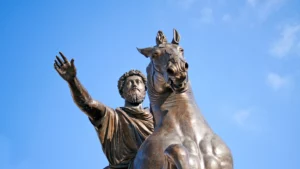
What if I told you that educational leadership does not have to be so stressful? A few years ago, I might not have believed it myself, but over the last few years I’ve learned a new way to go about my job that brings me so much peace.
These jobs have placed me in a lot of stressful situations, but I’ve discovered that when we acknowledge our stress and devise a plan to counteract them, things go much more smoothly.
For me, I’ve found that abiding by the ancient Greek philosophy of Stoicism makes the job easier all around, particularly when it comes to team building, collaborating, problem-solving, and building staff capacity.
AN OVERVIEW OF STOICISM
Research shows that emotionally intelligent leaders produce results, bring about transformational change, and inspire others because they demonstrate high levels of self-awareness, self-regulation, motivation, and empathy.
Emotional intelligence is a concept that psychologist Daniel Goleman conceptualized in the 1990s. However, classical Stoicism has been around since the third century BCE. The core of Stoicism is summed up in a quote by Epictetus, “It’s not what happens to you but how you react to it that matters.”
Stoicism teaches the development of self-awareness, self-regulation, and perseverance to overcome rash and detrimental emotions such as anger and envy. One could conclude that Stoics were among the original emotionally intelligent leaders, and that is why modern-day leaders should embrace Stoicism in the school setting.
Using Ancient Philosophy to Curb Stress
When leaders are emotionally intelligent, they know their emotional state and stress levels. This awareness allows them to carefully choose their perception, perspective, mood, response, and actions. Adopting a Stoic mindset will consistently allow you to lower your stress levels.
You have probably never correlated Stoicism with school leadership and may be asking yourself, what is a Stoic mindset, and why should I acquire one?
Acquiring a Stoic mindset requires a sound understanding of what Stoicism is and isn’t. Stoicism is a 2,300-year-old philosophy founded in Athens by Zeno of Citium (modern-day Cyprus) c. 300 BCE. The most well-known Greek and Roman Stoics are Zeno of Citium, Marcus Aurelius, Seneca, Epictetus, and Chrysippus. Courage, temperance, justice, and wisdom are the four virtues of Stoicism.
The essence of Stoic philosophy is perception, action, and will. Ultimately, Stoicism promotes empathy and understanding in our interpersonal relationships. In English, stoic is defined as the unemotional endurance of pain. However, Stoics are not aloof and emotionless. Instead, Ryan Holiday and Stephen Hanselman, authors of Lives of the Stoics, argue that Stoics are highly emotionally intelligent and detached from judgment, rash decision-making, and negative emotions.
How can a school leader demonstrate courage, temperance, justice, and wisdom daily? In short, Stoic leaders have a certain way of life.
COUNTERACTING LEADERSHIP STRESS
“You have power over your mind, not outside events; realize this, and you will find strength.” —Seneca
The great Stoic Seneca believed that our mind is a potent tool. Mind over matter is essential to curbing stress. As an educational leader, you will experience stress. The key to managing it is to have radical acceptance of the things outside of your control. Radical acceptance is a tool used in dialectical behavior therapy (DBT) to help clients grasp the present moment for what it is and look at it detachedly rather than purely emotionally.
Adopting radical acceptance is not pessimistic; in fact, it’s the opposite, and it will allow you to clearly identify your leadership stressors and plan accordingly.
Ultimately, Stoicism is the art of letting go of things in life that are out of your control. In addition to exercising radical acceptance and not worrying, Stoics master the discipline of perception.
Dr. Cynthia Ackrill, an expert in stress reduction, states, “Stress is your physical and mental reaction to what you perceive is happening. And that’s a crucial part of the sentence: your reaction to what you perceive is happening. The majority of [stress] does depend on perception. Whenever our perception doesn’t meet our expectations, we feel stressed.”
Stoic leadership is a lifestyle and mindset that one must acquire, employ, and intentionally activate through emotional intelligence. A leader is most productive when they can quickly sift through the minutiae of leadership. Leadership will always have obstacles, so adopting a Stoic mindset is key.
